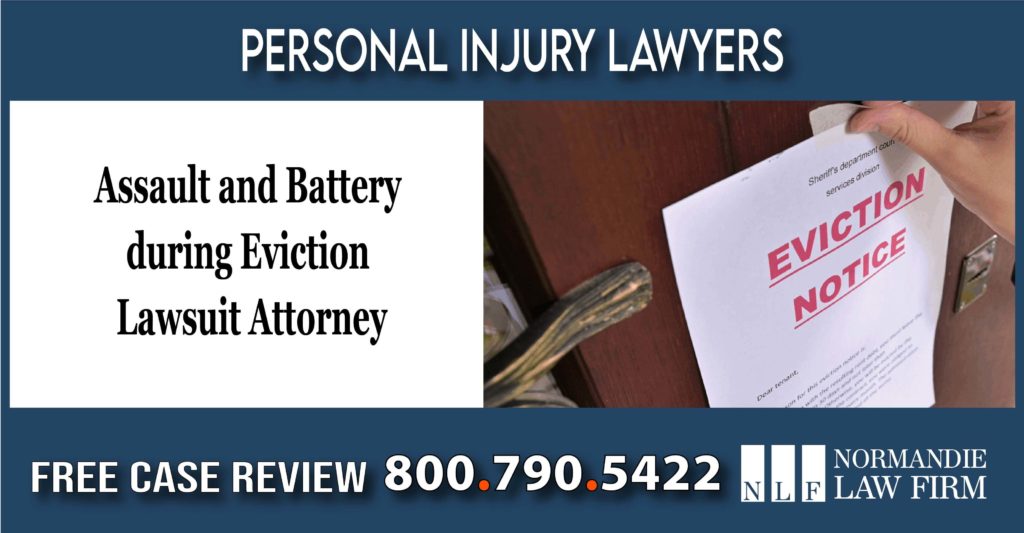With the soaring prices in America’s housing markets, owning a home is less of a possibility than it was in previous generations. As a result, over 30 percent of all available housing are rental units, according to the U.S. Census. Unfortunately, the relationship between renters and landlords has taken a hit within the past few years due to the effects of COVID 19. Job loss, even on a temporary basis, caused many tenants to default on their rent. Even now, some of these renters are struggling to catch up and avoid the devastation of homelessness. On the other hand, landlords are also victims in this vicious cycle, as they are forced to keep up with taxes and maintenance costs associated with their properties.
Predictably, there has been a significant increase in violent altercations between landlords and tenants. Fights can happen during an illegal eviction, where the landlord kicks out the tenant without following the state’s eviction procedures. Tenants can also be driven out by threats, false accusations, or harassment, which are all forms of wrongful eviction. However, even if the tenant is evicted legally, they may be subjected to assault and battery during the eviction process.
If you were beaten up, threatened, or placed in danger of your life while being evicted, our lawyers can help you file a lawsuit against your landlord. We can also assist you if you were forced to leave the premises due to acts of harassment and retaliation. To learn more about your rights and legal options, please give us a call at your earliest convenience.

Our Recent Verdicts and Settlements
$2.5 Million
$600,000
$1.5 Million
$54 Million
$525,000
$1.2 Million
What Counts as Assault and Battery during Eviction?
This is an excellent question, since an illegal eviction of tenant resulting in injury doesn’t automatically count as assault and battery. First, it’s important to understand that assault and battery are two separate offenses, though they usually go together. If we look at California’s Penal Code 240, assault refers to the attempt to physically harm someone, usually in the form of a threat. This means there is no physical force, like punching or kicking, but it’s reasonable to assume that the person wants to harm you. Acts of assault include:
- During an argument, your landlord clenches their fist and says, “See what happens if you say that again.”
- Your landlord changed the locks in an effort to illegally evict you. When you threaten to call the cops, your landlord pulls out a gun and makes you leave the property.
- Before your court date to fight an eviction, your landlord and his relatives confront you in the driveway of your home and threaten bodily harm if you don’t leave without making a fuss.
Now, let’s look at the “battery” portion of assault and battery, which is the actual infliction of physical force. This means the landlord attacked you without provocation, or to put it another way, they were not in imminent danger. Here are some examples of battery the can happen during an eviction:
- Your landlord forcibly drags you out of the apartment when you refuse to leave without a court order.
- During an argument where insults are exchanged (but there are no threats or intimidation), your landlord shoves you and knocks you down.
- Your landlord throws something at you in order to cause injury, and it was clearly not an act of self-defense.
These are only examples, and we understand that many cases of assault and battery are far more complicated. During a free consultation at our office, we will go over the details of your incident and help you decide on the best course of action for your case.
Injuries from being Assaulted by a Landlord
A physical assault can cause serious injuries to any part of your body, so please get medical attention right away if you’ve been beaten up, jumped, or physically harmed in any way by your landlord. Immediate treatment is the best way to keep your injuries from getting worse and preventing permanent health complications. Possible injuries from an assault and battery while being evicted include:
- Broken nose
- Dislocated jaw
- Punctured eye / damage to the eye socket
- Deep cuts
- Scarring / disfigurement
- Damage to the internal organs
- Dental damage (broken / missing teeth)
- Broken bones in the arms and legs
- Hip fracture
- Fractured ribs
- Damage to the neck and spinal cord
- Concussion
- Skull fracture
- Traumatic brain injury
- Nerve damage
- Paralysis
Victims of violence also suffer from emotional trauma, and find it hard to cope with mental health issues, like anxiety, insomnia, and PTSD. These are compensable injuries, just like broken bones and fractures, but you will need an experienced attorney to fight for these damages. The lawyers of Normandie have many years of experience with trauma-related cases. We can help you obtain the full value of your losses in a lawsuit for assault and battery during an eviction.
Can I Sue for Assault and Battery while being Evicted?
Yes, you can sue your landlord if they committed an act of assault and battery against you. Aside from filing a lawsuit, you have the right to file criminal charges against your attacker. You can pursue both types of legal actions at the same time, but many claimants start the process with a civil complaint. This can be beneficial, as the burden of proof for a criminal prosecution is extremely high. By winning an injury claim or lawsuit, you can automatically strengthen your case with the criminal courts.
One thing we want to caution you against is not calling the police. A lot of victims choose to avoid getting the cops involved, but keep in mind that you do not have to seek criminal prosecution if you file a police report. The main goal of a police report is to establish an immediate record of the facts and talk to witnesses while things are still fresh in their memory. This is an important piece of evidence for your lawsuit, so please contact the police as soon as possible. Once you’ve spoken with the authorities, you should learn about your right to seek compensation from the party that’s responsible for your injuries.
An assault and battery during eviction lawyer is waiting to speak with you, so contact our office without delay.
What kind of Damages can I Include in my Lawsuit?
A civil action for assault and battery can help you recover a variety of damages that are associated with your attack. Some of these damages have to do with economic losses, like the cost of medical treatments, lost wages, and property damage for lost or destroyed belongings. Other forms of compensation, such as pain and suffering and emotional distress are associated with the trauma of being assaulted by your landlord.
The exact losses you can recover from a lawsuit depend on your personal circumstances, which our attorneys can assist you with. Contact us right away and to get started on a claim for assault and battery during an eviction.
What is the Average Value for an Assault and Battery Lawsuit?
The degree of your injuries, their long-term impact on your life, and the available evidence to support your case are just some of the factors that are used to approximate the value of your lawsuit. On the lower end, an assault and battery case may be worth around $50,000 or less. Cases with moderate injuries may be valued at around $75,000 to $250,000, as long as the evidence is there to back up the level of harm you’ve suffered. The biggest settlements are usually for cases involving lifelong health complications, like traumatic brain injury and loss of function. Recovery on behalf of these victims may be in the neighborhood of $1 million or more.

How long does it take to get Paid on these Cases?
The timeline for an assault and battery claim can be as short as 30 days, though many cases take at least a few months to resolve. Ideally, our goal is to settle your case within 6 months, which includes the amount of time it takes to negotiate a fair amount of damages. However, settlement offers and counter offers can take up quite a bit of time, which means 12 to 18 months may be needed to negotiate a favorable settlement. If the other side is acting in bad faith and a lawsuit becomes necessary, you may need to wait two or more years to receive your payment.
Is there a Time Limit to Sue for Assault and Battery?
In California, you have two years to file a lawsuit for an act of “assault, battery, or injury to, or for the death of, an individual caused by the wrongful act or neglect of another.” This two year period is known as the statute of limitations, and it’s essential that you take legal action within this amount of time. Normally, the SOL begins on the date you were assaulted, though it can also apply to the date you discover an injury from the assault. There are very few cases where the courts will grant an exception to the SOL, so please call us right away to ensure that your claim is filed on time.
Speak with one of our Attorneys
As the victim of unprovoked violence, you have the right to seek justice in the form of a civil lawsuit against your attacker. Our assault and battery lawyers are committed to representing you and fighting for the compensation you deserve.
We understand that you may be concerned about the cost of hiring an attorney. At Normandie Law Firm, our clients are never charged upfront as a promise under our Zero fee guarantee. That means we will advise you of your rights, negotiate your settlement, and take your case to trial if necessary at no cost to you. The only time we get paid is at the end of your case, when our fees are recovered as a part of your settlement award. If we fail to recover you damages, we eat the costs because we don’t make a cent unless you do.
Please give us a call and schedule a free case evaluation. We look forward to representing you and doing all that we can to assist you in your journey to recovery.
Other Pages on Our Website Related to This Topic
Assaulted By Hospital Security Guard – Attorney
Can I Sue Someone for Sexual Assault If They Died – No Longer Alive Attorney
Can a Property Owner Liable for Sexual Assault on their Premises












